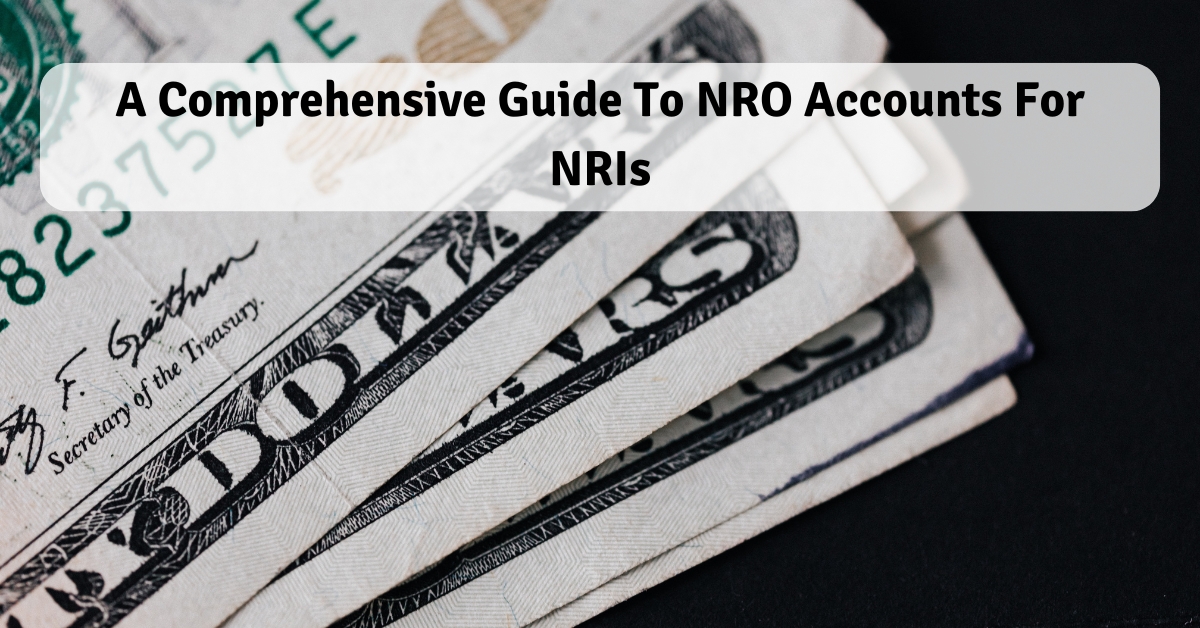A Comprehensive Guide to NRO Accounts for NRIs

“Have you recently relocated abroad for work or studies? While this might be exciting, you may face several challenges. FEMA regulations stop NRIs from holding standard savings accounts. The purpose of this guide is to introduce, in detail, NRO accounts for NRIs, allowing them to make informed financial decisions and optimize their financial efficiency regardless of geographic boundaries.”
What are NRO accounts?
NRO accounts are designed for Non-Resident Indians (NRIs) to manage income earned within India, including rent, dividends, pensions, and other earnings. These accounts function in INR. They cannot hold foreign currency. Any foreign income deposited in the account is first converted to Indian Rupees (INR). Withdrawals from the account are in INR, but funds can be repatriated in foreign currency, up to USD 1 million per financial year, including interest. Interest earned on the amount deposited into the account is subject to a 30% TDS (Tax Deducted at Source), although tax treaties may provide deductions.
Who is eligible to open an NRO account?
Any resident outside India (as per section 2 (w) of FEMA), including NRIs, may open and maintain an NRO account with an authorised dealer or bank. The eligibility criteria include the following categories of individuals:
- NRIs who earn income in India, such as rental income, FD income, royalties, mutual fund dividends, etc and require an account to manage their funds.
- NRIs residing outside India for employment, studies, business, vocation, or as mariners, working on oil rigs, or foreign registered airlines.
- PIOs (Persons of Indian Origin) or OCIs (Overseas Citizens of India) who hold a foreign passport (other than Pakistani and Bangladeshi) and meet certain conditions, such as having held an Indian passport at any point in time, being a spouse of an Indian Citizen or PIO, or having a parent or grandparent who was, as per the Constitution of India, or the India Citizen Act 1955, a citizen of India.
- Foreign Nationals of Non-Indian (excluding Pakistani and Bangladeshi individuals) origin visiting India, with funds remitted from outside India through banking channels or through sale of foreign currency brought by them to India, can also open NRO accounts. The balance in the account can be remitted to them at the time of their departure from India, provided that the account is maintained for a maximum period of six months and the only credit on the account is the interest accrued on the account.
- Individuals or Entities of Pakistani or Bangladeshi nationality can only open NRO accounts with prior approval of RBI. However, individuals from Bangladesh or Pakistan who belong to minority communities such as Hindus, Sikhs, Buddhists, Jains, Parsis, and Christians, residing in India and granted a long-term Visa or having their long-term visa application under consideration, are permitted to open a single NRO account with an authorized dealer or bank. This permission is subject to the conditions outlined in Notification No. FEMA 5(R)/2016-RB dated April 01, 2016, and subsequent updates. Additionally, individuals or entities of Bangladeshi nationality may also open NRO accounts provided they possess a valid Visa and Residential permit issued by the Foreigner Registration Office (FRO) or Foreigner Regional Registration Office (FRRO).
- Indian post offices have the authority to maintain savings bank accounts for individuals residing outside of India, permitting transactions on these accounts under the same terms and conditions applicable to NRO accounts held with authorized dealers or banks.
Maintenance of NRO Accounts
Based on particular terms and conditions of your respective bank, NRO accounts are eligible to be established and upheld as savings, current, or fixed deposit accounts.
Ownership of NRO Accounts
NRO accounts offer two ownership possibilities for NRIs:
- Single Ownership: This is the simplest option, where the NRI opens the account solely in their name. This provides complete control and access to the funds in the NRI’s account.
- Joint Ownership with “Former or Survivor”: NRIs and PIOs can also hold a joint NRO account with another NRI, PIO or a resident Indian, but with a specific clause. As per RBI regulations, the only permitted joint ownership option is “former or survivor.” This means that, during the NRI’s Lifetime only the NRI (“former”) can operate the account and manage the funds and upon their death, the resident Indian (“survivor”) automatically inherits the entire balance in the account. It is important to note that the “either or survivor” option, where both account holders have equal access and management rights, is not allowed for NRO accounts.
- An NRI has the option to provide a resident Power of Attorney, with the condition that the activities conducted on the account are restricted to handling all INR transactions for eligible investments in accordance with RBI regulations. Additionally, it allows for the remittance of current income earned in India by the NRI account holder, after deduction of taxes, to a foreign account. However, the Power of Attorney cannot transfer funds to any account apart from the NRI account, nor can it make payments on behalf of the NRI for any other purpose.
- A nomination facility is available for these accounts.
Documents Needed to open an NRO account
To open an NRO (Non-Resident Ordinary) account, an NRI (Non-Resident Indian) would need to provide the following documents:
- Identity proof: A photocopy of a valid passport is required.
- Address proof: An address proof for the residence abroad is required.
- Income proof: Income proof documents such as Form 60 are required, along with a PAN card.
- Proof of NRI or PIO status: A passport-sized photograph and evidence confirming NRI or PIO status are also required.
Certain documents may require attestations at the nearest Indian embassy, by a notary, or at an overseas branch of an Indian bank located in the individual’s country of residence.
Any of the following must attest all photocopies of the above proofs:
- Authorized officials at overseas branches of Scheduled Commercial Banks registered in India.
- Branches of overseas banks with whom Indian banks have relationships.
- Notary Public abroad.
- Court Magistrate, Judge, Indian Embassy/Consulate General in the country where the non-resident customer resides.
When a resident Indian becomes a person outside India, upon submission of the above documents, his existing resident accounts should be designated as NRO accounts. It is obligatory on the part of the NRI to advise the bank about their change in status.
Permissible Credits to an NRO account include: –
- Inward remittances from out of India
- Legitimate dues in India
- Transfers from other NRO accounts
- A rupee gift or loan extended by a resident to an NRI/PIO relative, within the specified limits under the Liberalized Remittance Scheme, can be deposited into the NRO account of the recipient.
Permissible Debits to an NRO account: –
- The account can be debited for local payments.
- Transfers to other NRO accounts
- Remittance of current Indian income abroad.
- The remaining balances in the NRO account cannot be transferred abroad, except by NRIs and PIOs, up to a limit of USD 1 million, subject to the conditions outlined in the Foreign Exchange Management (Remittance of Assets) Regulations, 2016.
- Funds can also be transferred to an NRE account within this USD 1 Million facility.
- Reserve Bank has given general permission to AD Category 1 banks to allow foreign nationals to collect their pending dues from the NRO account on leaving the country provided that: –
(a) The amount is the dues owed to them from when they were a resident of India.
(b) The funds will be repatriated abroad immediately after the taxes are duly paid.
(c) The amount cannot exceed USD 1 million per financial year.
(d) The only debit on the account should be the repatriation to the holder’s foreign account.
(e) The account should be closed immediately once the holder declares that the dues were received and repatriated.
Loan Facility: –
Authorised Dealers can issue International credit cards to NRIs/PIOs. Transactions on the card can be settled by inward remittance or by balance in the NRO account.
Loans against the deposits can be granted to the account holder or third party in India, subject to usual norms and margin requirements. The loan amount cannot be utilized for purposes such as re-lending, engaging in agricultural or plantation activities, or investing in real estate. The term “loan” encompasses all forms of fund-based and non-fund-based facilities.
Implications of Tax on NRO Accounts: –
NRO (Non-Resident Ordinary) accounts are designed for NRIs to manage their income earned in India, such as rent, dividends, pensions, etc. The interest earned on NRO account balances is subject to income tax in India, with the tax rate based on the individual’s income slab. NRO (Non-Resident Ordinary) accounts are taxed at 30% of the total income accrued in India, as per the Income Tax Act of 1961. Additionally, a cess at 3% is applicable to the overall income. However, there are certain deductions and exemptions available to NRIs to reduce the tax liability. NRO account holders can reduce their tax liability by utilizing deductions under Section 80C of the Income Tax Act. These deductions can be availed by investing in tax-saving instruments such as PPF (Public Provident Fund), NSC (National Savings Certificate), and ELSS (Equity-Linked Savings Scheme). Additionally, NRIs can also claim tax deductions of up to Rs. 50,000 under Section 80CCD(1B) of the Income Tax Act by investing in the NPS (National Pension System).
In conclusion, NRO accounts offer NRIs a valuable tool to manage their Indian finances effectively. By understanding the eligibility criteria, account features, and permissible transactions, you can leverage your NRO account to its full potential. Remember to consult with a tax advisor regarding the specific tax implications on NRO account interest for your situation. With careful planning and informed decisions, you can ensure your NRO account helps you achieve your financial goals in India, even while residing abroad.
If you have any queries on NRO accounts or if you would like to get more information on these accounts, their taxation policy and their benefit to you, consult a financial advisor who specializes in NRI services.
We would like to hear more about your experience with NRO accounts. Reach out to us at office@primewealth.co.in




